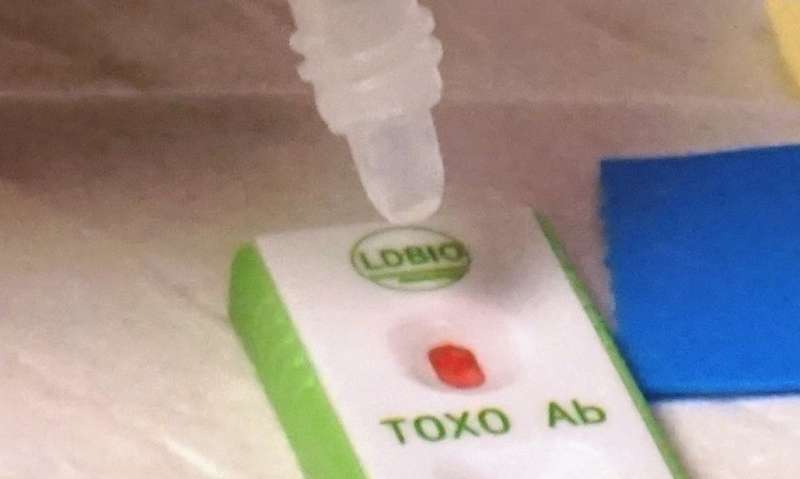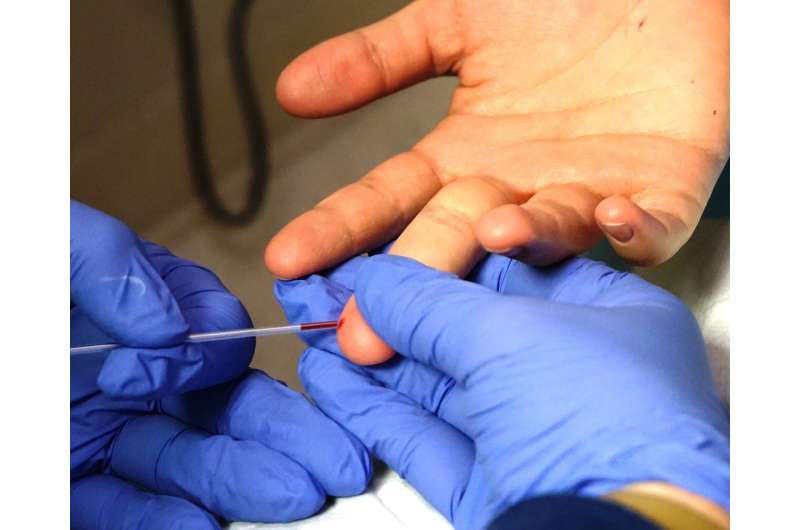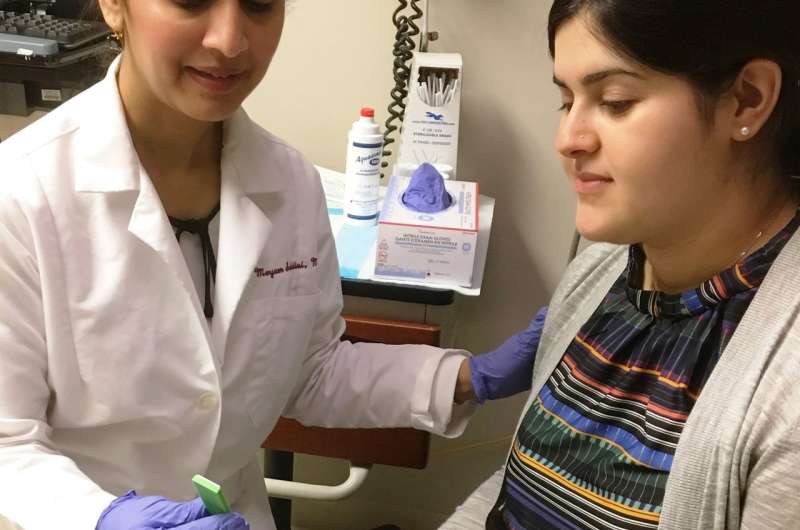Reliable point-of-care blood test can help prevent toxoplasmosis

A recent study, performed in Chicago and Rabat, Morocco, found that a novel finger-prick test for infection with the parasite Toxoplasma gondii during pregnancy—and many other potential applications—is 100 percent sensitive and 100 percent specific for detecting the presence of this life-damaging microorganism.
A positive result from the Toxoplasma ICT IgG-IgM point-of-care test, performed with a drop of a pregnant woman's blood, can rapidly inform an obstetrician about the need for prompt treatment of toxoplasmosis. Timely intervention before birth can prevent the disease, which can cause death, severe brain damage and loss of sight in an infected fetus.
The test, developed by LDBIO Diagnostic of Lyon, France, "meets the World Health Organization's criteria for an optimal point-of-care test," said toxoplasmosis specialist Rima McLeod, MD, a professor of ophthalmology and visual science and pediatrics at the University of Chicago Medicine.
"It is sensitive and specific, quick and easy to perform, equipment-free, and easily utilized," she said. "Results are available in half an hour while the patient is seeing the doctor. A positive result can be confirmed quickly, so health care providers can immediately begin treatment."
The test is also inexpensive. It costs $4 to $5 per test. Pregnant women at risk should be tested eight to 10 times—once a month during pregnancy, beginning in the 12th week, then once more four to six weeks after delivery. Total cost for repeated tests is about $40 to $50. Hospitals and clinics in developed countries charge substantially more.

"This well-studied, inexpensive test opens the door to life, sight and cognition-saving treatments for children exposed to the parasite in utero," said McLeod. By spotting the infection early with monthly testing and alerting physicians to the need for urgent treatment, "it markedly improves outcomes for infants infected in utero," she said. "This test leads to prevention of the severe consequences of Toxoplasma gondii infection and saves lives."
"A paper cut," she added, "is more painful than the finger prick for this test."
Toxoplasma gondii gains access to human hosts when they eat undercooked contaminated meat or are exposed to material contaminated by feces from an acutely infected cat, which usually goes unrecognized. Current methods of detecting the infection include serum tests, which require blood samples to be processed using technologies that are often cost prohibitive in developing areas and "may be considered too costly even in developed countries," McLeod said.
In the August 16, 2018 issue of PLOS Neglected Tropical Diseases, a study by researchers based at the University of Chicago Medicine shows that the new test "performed with high sensitivity and specificity. It obviates the need for venipuncture and sample processing." The test is accurate whether the patients were recently exposed or infected long before testing.
The LDBIO test relies on an immuno-chromatographic lateral-flow assay. This is a paper-based system designed to detect the presence (or absence) of a specific target—in this case the IgG and IgM antibodies—by slowly flowing the liquid sample through a paper matrix and over a substance that binds to the antibodies and causes the appearance of a colored band.

The researchers, including colleagues in the United States, France and Morocco, collected and tested 244 samples from 205 individuals. Overall, 101 of the samples indicated that the patients had developed antibodies against T. gondii. The other 143 samples did not have T. gondii antibodies.
Blood from these volunteer donors was examined in multiple ways. The researchers compared reference tests and standard-of-care serum tests against the finger-stick test. The new test's results with whole blood exactly matched those from established but more cumbersome methods, even for women with low levels of anti-T. gondii antibodies.
Although the test does not distinguish between acute and chronic infections, it provides valuable information that can guide decisions in outpatient settings at very low cost, enabling rapid diagnosis and treatment for infections acquired just before or during pregnancy.
"Adoption of this type of high functioning point-of-care test would reduce costs substantially and require significantly less infrastructure than conventional testing," the researchers conclude. "Value also arises from bringing pregnant women into care, leading to screening for other preventable and treatable conditions."
"Testing of pregnant women for this infection has already changed how this parasite affects babies in France, Austria, Germany and Colombia," McLeod said. "This test should facilitate similar improvements in patient care and well-being in the U.S. and many other developed and developing countries."
The makers are submitting the point-of-care test for approval by the U.S. Food and Drug Administration based on recent U.S studies, but it has not yet been approved.
More information: PLOS Neglected Tropical Diseases (2018). journals.plos.org/plosntds/art … journal.pntd.0006536




















